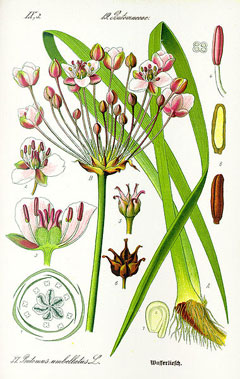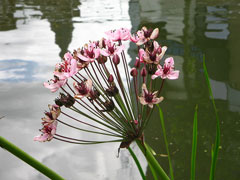 |
|
http://commons.wikimedia.org/wiki/File:Illustration_Butomus_umbellatus1.jpg |
 |
| http://commons.wikimedia.org/wiki/User:Taka |
Translate this page:
Summary
Physical Characteristics

 Butomus umbellatus is a PERENNIAL growing to 1 m (3ft 3in) by 0.5 m (1ft 8in) at a medium rate.
Butomus umbellatus is a PERENNIAL growing to 1 m (3ft 3in) by 0.5 m (1ft 8in) at a medium rate.
See above for USDA hardiness. It is hardy to UK zone 5. It is in flower from July to September, and the seeds ripen from August to September. The species is hermaphrodite (has both male and female organs) and is pollinated by Bees, flies, Lepidoptera (Moths & Butterflies).
Suitable for: light (sandy), medium (loamy) and heavy (clay) soils. Suitable pH: mildly acid, neutral and basic (mildly alkaline) soils. It cannot grow in the shade. It prefers wet soil and can grow in water.
UK Hardiness Map
US Hardiness Map
Synonyms
Plant Habitats
Pond; Bog Garden;
Edible Uses
Edible Parts: Root Seed
Edible Uses:
Tuber - cooked[5, 46, 61, 100, 177]. It should be peeled and the rootlets removed[179]. The root can also be dried and ground into a powder[179], it can then be used as a thickener in soups etc, or be added to cereal flours when making bread[2]. It contains more than 50% starch[13]. Seed[1, 2, 5, 177]. No more details are given, but the seed is very small and fiddly to use[K].
References More on Edible Uses
Medicinal Uses
Plants For A Future can not take any responsibility for any adverse effects from the use of plants. Always seek advice from a professional before using a plant medicinally.
None known
References More on Medicinal Uses
The Bookshop: Edible Plant Books
Our Latest books on Perennial Plants For Food Forests and Permaculture Gardens in paperback or digital formats.

Edible Tropical Plants
Food Forest Plants for Hotter Conditions: 250+ Plants For Tropical Food Forests & Permaculture Gardens.
More

Edible Temperate Plants
Plants for Your Food Forest: 500 Plants for Temperate Food Forests & Permaculture Gardens.
More

More Books
PFAF have eight books available in paperback and digital formats. Browse the shop for more information.
Shop Now
Other Uses
Butomus umbellatus is cultivated as an ornamental waterside plant.
Special Uses
Scented Plants
References More on Other Uses
Cultivation details
Requires a sunny position[200]. A plant of wet habitats, it succeeds in wet soils and in water up to 30cm deep[24, 56]. A very ornamental plant[2]. The flowers have a scent of bitter almonds[245].
References Carbon Farming Information and Carbon Sequestration Information
Temperature Converter
Type a value in the Celsius field to convert the value to Fahrenheit:
Fahrenheit:
The PFAF Bookshop
Plants For A Future have a number of books available in paperback and digital form. Book titles include Edible Plants, Edible Perennials, Edible Trees,Edible Shrubs, Woodland Gardening, and Temperate Food Forest Plants. Our new book is Food Forest Plants For Hotter Conditions (Tropical and Sub-Tropical).
Shop Now
Plant Propagation
Seed - best surface-sown in a cold frame as soon as it is ripe, it usually germinates in the spring. The seed quickly loses its vitality if it is not kept moist[200]. When large enough to handle, prick the seedlings out into individual pots and grow them on in a tray of water in the cold frame, planting them out into their permanent positions in early summer. Division in spring[188]. Very easy, larger clumps can be planted direct into their permanent positions. It is best to pot up smaller clumps and grow them on in a cold frame until they are well rooted before planting them out in the summer.
Other Names
If available other names are mentioned here
Flowering Rush, Grassy rush, Water gladiolus, Vodoljub.
Native Range
TEMPERATE ASIA: Afghanistan, Iran, Iraq, Israel, Jordan, Lebanon, Syria, Turkey, Russian Federation-Ciscaucasia (Ciscaucasia), Armenia, Azerbaijan, Georgia, Russian Federation (Dagestan), Russian Federation-Western Siberia (Western Siberia), Russian Federation-Eastern Siberia (Eastern Siberia), Kazakhstan, Turkmenistan, Uzbekistan, Mongolia, Russian Federation (Primorye), China (Hebei Sheng, Henan Sheng, Hubei Sheng, Jiangsu Sheng, Nei Mongol Zizhiqu, Shaanxi Sheng, Shandong Sheng, Shanxi Sheng, Xinjiang Uygur Zizhiqu) EUROPE: Denmark, Finland, United Kingdom, Ireland, Norway, Sweden, Austria, Belgium, Switzerland, Czech Republic, Germany, Hungary, Netherlands, Poland, Slovakia, Russian Federation (European part), Belarus, Estonia, Lithuania, Latvia, Moldova, Russian Federation (Astrakhan, Kalmykija, Respublika, Saratov, Volgogradskaja oblast), Ukraine (incl. Krym), Albania, Bulgaria, Bosnia and Herzegovina, Greece, Croatia, Italy, Montenegro, Romania, Serbia, Slovenia, Spain, France, Portugal AFRICA: Algeria, Morocco
Weed Potential
Right plant wrong place. We are currently updating this section.
Please note that a plant may be invasive in one area but may not in your area so it's worth checking.
This plant can be weedy or invasive. Invasive in the US. Connecticut - Potentially invasive, banned. Vermont - Class B noxious weed. Washington - Wetland and aquatic weed quarantine.
Conservation Status
IUCN Red List of Threatened Plants Status : Butomus umbellatus (Flowering-rush )
Status: Least Concern

Growth: S = slow M = medium F = fast. Soil: L = light (sandy) M = medium H = heavy (clay). pH: A = acid N = neutral B = basic (alkaline). Shade: F = full shade S = semi-shade N = no shade. Moisture: D = dry M = Moist We = wet Wa = water.
Now available:
Food Forest Plants for Mediterranean Conditions
350+ Perennial Plants For Mediterranean and Drier Food Forests and Permaculture Gardens.
[Paperback and eBook]
This is the third in Plants For A Future's series of plant guides for food forests tailored to
specific climate zones. Following volumes on temperate and tropical ecosystems, this book focuses
on species suited to Mediterranean conditions—regions with hot, dry summers and cool, wet winters,
often facing the added challenge of climate change.
Read More
Expert comment
Author
L.
Botanical References
17200
Links / References
For a list of references used on this page please go here
Readers comment
| Add a comment |
|
If you have important information about this plant that may help other users please add a comment or link below. Only comments or links that are felt to be directly relevant to a plant will be included. If you think a comment/link or information contained on this page is inaccurate or misleading we would welcome your feedback at [email protected]. If you have questions about a plant please use the Forum on this website as we do not have the resources to answer questions ourselves.
* Please note: the comments by website users are not necessarily those held by PFAF and may give misleading or inaccurate information.
To leave a comment please Register or login here All comments need to be approved so will not appear immediately.
|
Subject : Butomus umbellatus
|
|
|
|